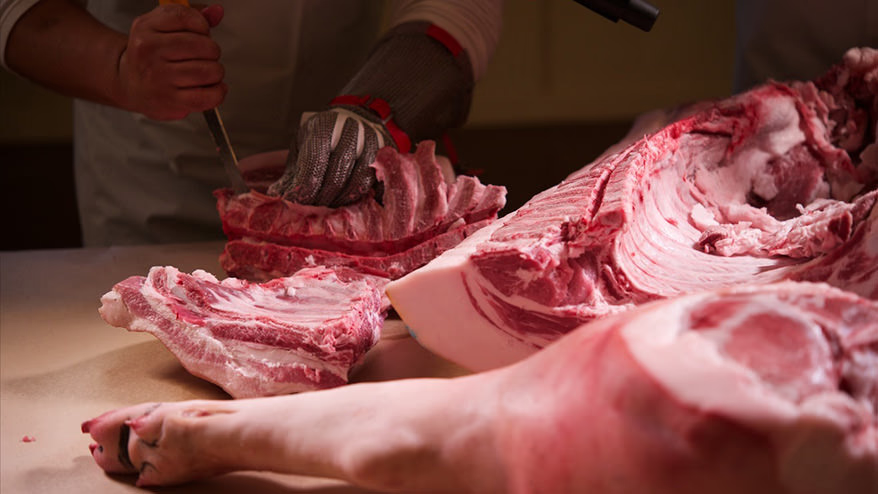あなたの人生がこの先そう長くないと知ったら何を食べたいですか?
また、それがあなたの家族や大切な人だったら、何を食べさせたいですか?
モノサス プロデュース部の部長の真鍋です。かなり唐突な投げかけですが、来年に向けて少し新しい動きが出てきているので、食についての投稿します。
個人的な活動※の話になるのですが、3年ほど前からNomadic Kitchenという食のプロジェクトを東京で小さなレストランを経営する4人の料理人たちと一緒に続けています。
※モノサスでは、本業と同じ職種でなければ、社員が事前に相談すれば個人的なプロジェクトを持つことを奨励しています。なので社内にはプロのバンドを続け全国をツアーしている社員もいれば、週末にギャラリーを経営している人もいたりします。
そのNomadic Kitchenの活動の一環で、今年のはじめに、とある外資系企業の社食を運営するチームと一緒に社員向けのイベントを開催しました。
その会社は、社員が社食で一緒に食べることで偶発的なコミュニケーションを発生させ、そこからイノベーションを生み出すということに加え、社員や彼らの家族の30年後の健やかな暮らしを考え、社員に毎日の食事を提供しています。一方、無償で毎日食事を提供していると、目の前にあるその料理が当たり前のものに思えることも同時に発生してくると思います。
昨今、食に関するテレビ番組や雑誌を多く見かけ、「最近、食って流行ってるよね〜」と言われることも少なくありません。しかしながら、それをきっかけに毎日料理をする人が増えたのかというと多分そうではなくて、ただその情報を消費することで満足してしまい、食そのものがどんどん「抽象的」な存在になっているのではと感じます。
その食の抽象化の対局にある食の実在性、リアリティとは何なのか。それをみんなで感じ、考えてみたくてこのイベントのテーマを「THINK DISH | 考えすぎて食べる日」としました。
考えすぎて食べる。
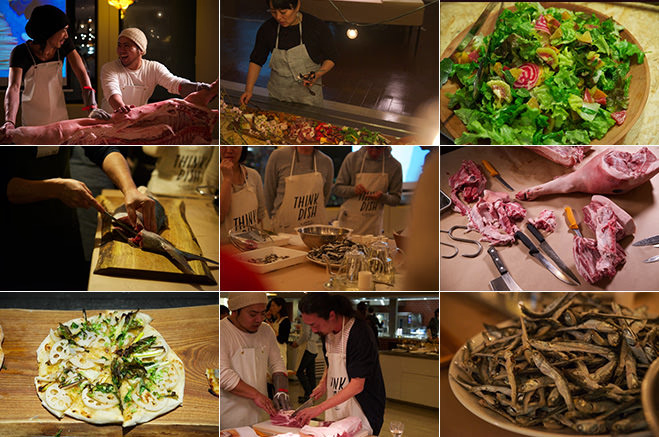
料理人たちの発案で、今までNomadic Kitchenの活動で訪れたことのある青森(魚)、神奈川(八百屋、伝統野菜)、和歌山(醤油)、香川(炒り子)、鹿児島(豚)の作り手の方々にお越しいただき、参加者がワークショップ形式で料理人と一緒に素材にふれ、対話し、食べながらすべての感覚を使って考えるというイベントになりました。
3年程前から付き合いのある鹿児島の「ふくどめ小牧場」の福留さんには、大切に育てたサドルバックポークの50kgの半身をそのまま丸ごと持ち込んでいただき、目の前で料理人と一緒にその半身を解体し、参加者にも大きな切身を一緒にさばく体験をしてもらいました。
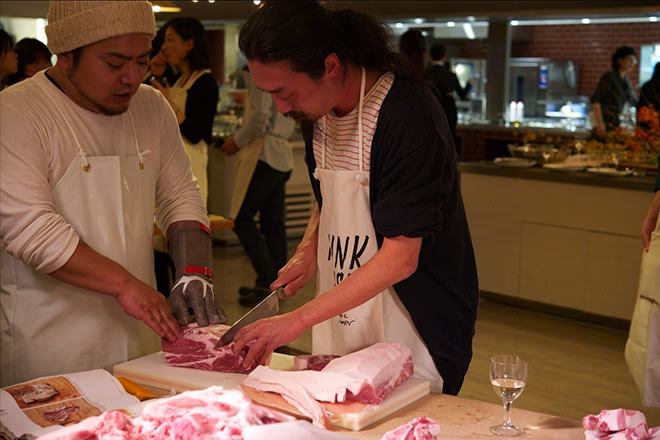
参加者からは「雌ですが雄ですか?」「何歳ですか?」という質問が飛び交った。生まれてからたった8ヶ月の大きな雌の豚の半身を目の前に、参加者からは「命を大切に頂かないと、と思った」などの声があった。
それ以外に、炒り子出汁の取り方、もろみから絞る醤油の味比べ、伝統野菜の話を聞きながらのピザ作り、青森の未利用魚の話や魚のさばき方など様々な体験をしてもらいました。
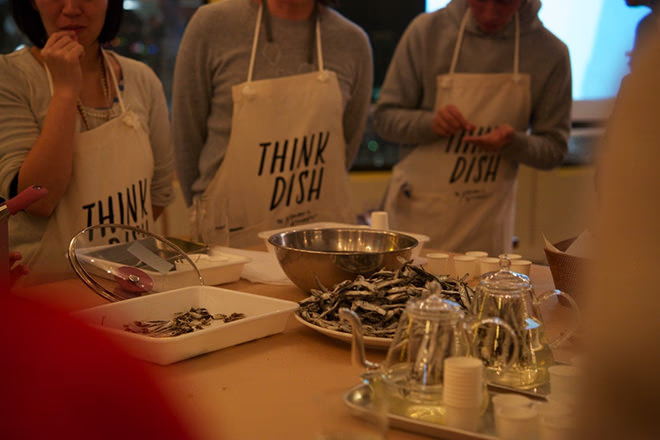
瀬戸内でとれる銀付き炒り子をつかった出汁のワークショップ
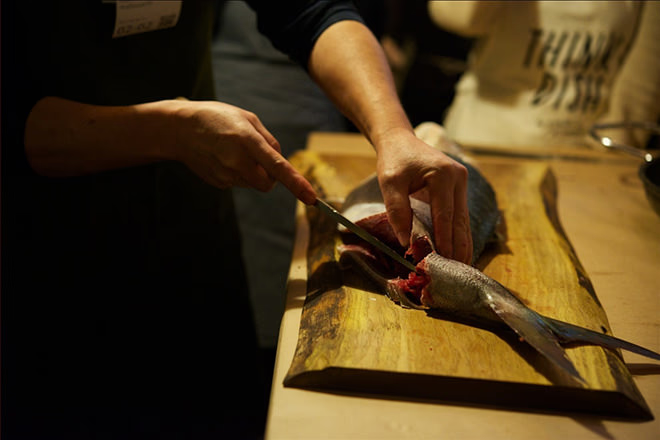
魚をさばくワークショップ。参加者には、小さなアジをさばいてもらった。実際にあなたは魚を自分の手でさばいたことはありますか?
その時感じたのは、毎日なんとなく過ぎていく「食べること」に対して、実際に身体を動かし感じることでしか、食べることのリアリティは取り戻せないということです。
日本には、とても素晴らしい手で作られる食文化がたくさん存在しています。
その先には、「機械」じゃなくて「人」がいます。
でも一方で、工場で大量に機械によって製造される非常に多くの食べ物があります。意識しないと私たちの暮らしのすべてが、そういった「商品」としての食べ物でうめつくされてしまいます。そして、食べたい、食べさせたい時には、その手で作られる食文化は、もうないかもしれません。
でも、みんなが少しだけ意識することで、大きく変わると思います。
なぜなら、それは毎日、毎食のことで、みんなのことだからです。
ここで書きたいのは、食が大事ということではなくて、誰かの仕事が自分たちの営みを支えてくれていて、それがみんなのこと=社会につながっていることを感じ、考えつづけることが大切じゃないかということです。
小さいもの:少量生産と
小さいもの:少量消費をつなぐ
神山町での食のプロジェクト。
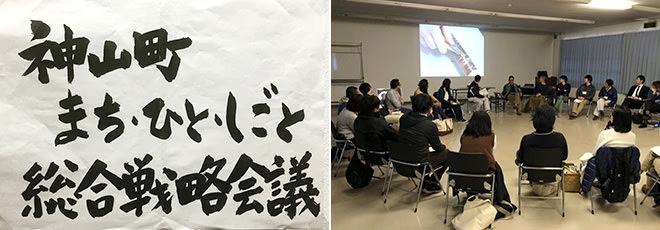
「暮らすように働く大人になろう。」という記事でも書きましたが、今年の7月から、神山町の地方創生の総合戦略を考えるワーキンググループに参加し、食のプロジェクトをやっている流れもあって、地域の“食べる”を考えるグループで活動しました。
神山は中山間地域ということもあり、農業には不利な立地であることや高齢化&後継者不足によって農業を続けることが難しくなり農地が荒れていく耕作放棄地増加の問題。更には、鹿、猪、猿などの獣害問題など課題は山積みです。また、地産地消とは名ばかりで、大きな市場の流れで、地元で取れた野菜が都市を経由し地元のスーパーに並んでいるということもあると聞きます。
こういった問題を一発解決!することは不可能なので、毎日の暮らしでは見えづらい「食と社会」とのつながりを、みんなのこととして見えるようにし、立場や世代をこえた人たちと食べることを通じて一緒に考え続けられる仕組みとしての場所をつくれないかと話し合いました。
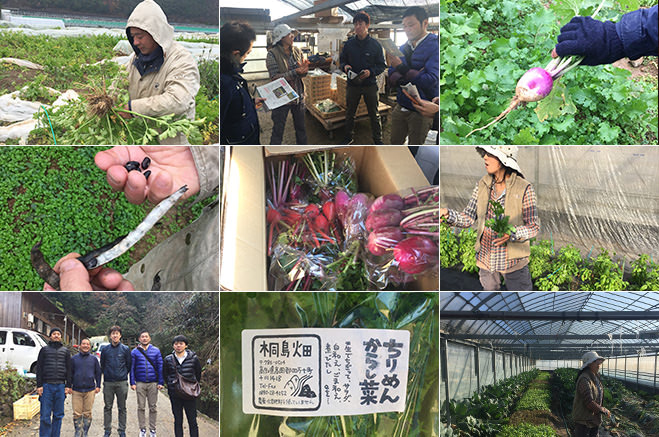
神山町の役場の人たちと高知で有機野菜を育てる農家さんを訪れた。
このワーキンググループは、12月14日(月)の最終回をもって解散し、この「食と社会」を考え続けるプロジェクトが本当に実現していくかどうかは、これからの私たちの行動次第だと思っています。
また新しい動きがあったら、ものさすサイトでご報告していきたいと思います。
